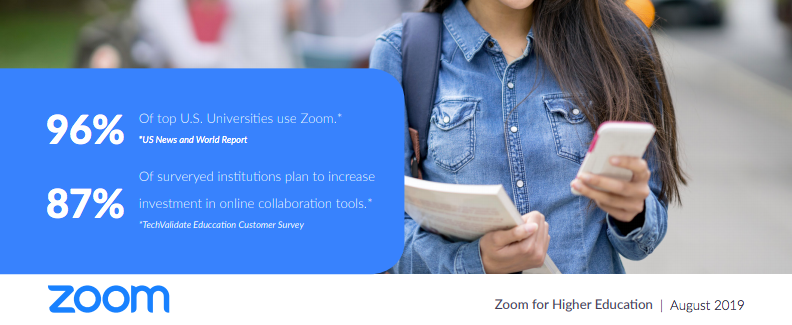Scholars who support academic freedom as a bedrock principle that universities must uphold are seeing a troubling pattern emerge regarding the use of Zoom as a modality for instruction and academic discourse. The act of adopting Zoom as the preferred infrastructure for disseminating synchronous information to students as well as other scholars was, arguably, the only viable option as universities had to expedite decision-making in order to keep faculty and students safe during the pandemic’s initial outbreak in March. The transition to fall semester distance learning incorporating Zoom in retrospect, seemed inevitable to the point of assumption. And despite outages and screen fatigue as the semester grinds on, academia as a whole would be hard-pressed to even imagine an alternative. Which makes recent troubling events surrounding Zoom, its use by universities and the impact of scholarly debate and teaching, somewhat concerning.

In fact, most of the growing concerns of academics’ use of Zoom coalesce around Zoom’s disinterest in confronting issues of academic freedom. Which isn’t surprising since Zoom was not created for academics but rather for business. Ads a result, Zoom’s terms and conditions provide Zoom with an enormous amount of power and control over who uses their video conferencing and webinar tools. Added to that toxic brew is the emerging reality that Zoom’s security is inadequate to prevent attacks on university virtual classrooms. Consider the following events surrounding Zoom’s willingness to censor and restrict content while at the same time providing insufficient security solutions to prevent trolling and Zoom-bombing aimed at quashing academic ideas:
- In June, Zoom faced enormous backlash for disabling accounts in the US that shared information about democracy protests in Hong Kong as well as events commemorating the 1989 Tiananmen Square Protests; Which is disappointing considering Zoom left the Chinese market in 2010 due to censorship concerns;
- News reports of frequent Zoom-bombings at universities intent on dismantling scholarship surrounding race, gender, sexuality and white supremacy. Universities attacked in this way include several CSU’s, Northwestern, Oklahoma City University, University of Texas, and University of Florida, among others;
- Recent events at San Francisco State University where Zoom prohibited the use of its platform to facilitate an academic panel featuring Leila Khaled, a member of the Popular Front for the Liberation of Palestine, the second largest group that makes up the Palestine Liberation Organization;
- Frequent news reports about the potential for identifying and harming students who are taking classes remotely from countries that have oppressive surveillance and human rights abuses.
Considering all of the above, it’s completely understandable that universities are beginning to express concerns for their students taking classes remotely from China due to the potential for widespread surveillance by the government. Additionally, the threat of Zoom disabling accounts of users or organizations that hold unpopular ideas as well as inadequate security which makes Zoom a potentially dangerous space for scholars working in areas of social justice and equality. Any of these things separately would indicate that the change to instruction over Zoom has significant repercussions for academic freedom. Taken collectively they point to a need for heightened vigilance by universities to ensure Zoom’s presence as the primary vehicle for instruction doesn’t further erode academic freedoms.
An October 8th letter to Zoom (as well as Facebook and YouTube) from the National Coalition Against Censorship, of whom the American Association of University Professors is a member, summarized the gravity and importance of the San Francisco State situation along with Zoom’s inadequate response:
… an American company that truly supports the free and open exchange of thoughts and ideas would not have silenced the San Francisco State panel. Knowing that no precedent exists for punishing an academic forum for allowing a member of a terrorist group to speak, such a company would have hosted the panel and dared the government to come after it. Such a company certainly would not have “played it safe” by canceling the session.
Additionally, in a late September Academe blog post, John Wilson, in response to Zoom’s censorship at San Francisco State, opined:
For those on the left who demand that tech companies censor speech they think are wrong or offensive, this is a chilling reminder that censorship is a dangerous weapon that can be turned against progressives. It’s also a reminder of how vulnerable online learning is under corporate control. All colleges that use Zoom ought to demand that Zoom commit to protecting free expression of academic classes and events on its platform.
The real problem with Zoom and academic freedom is one of locus of control. With Zoom, a corporate actor whose primary raison d’être is revenue, their ‘control’ over what information and ideas are permissible in a scholarly setting is an enormous potential threat to academic freedom. Universities, due to their unique role in collecting, developing and disseminating information in an effort to provide an enriching educational experience for its students by operating in accordance with their own standards supporting open debate and free expression, should be in the best position to make these decisions. Not a corporation who is primarily motivated to increase profits while preventing liability exposure (as if Section 230 of the Communications Decency Act of 1996 doesn’t provide more than adequate cover) for permitting dissemination of unprotected or unpopular ideas.